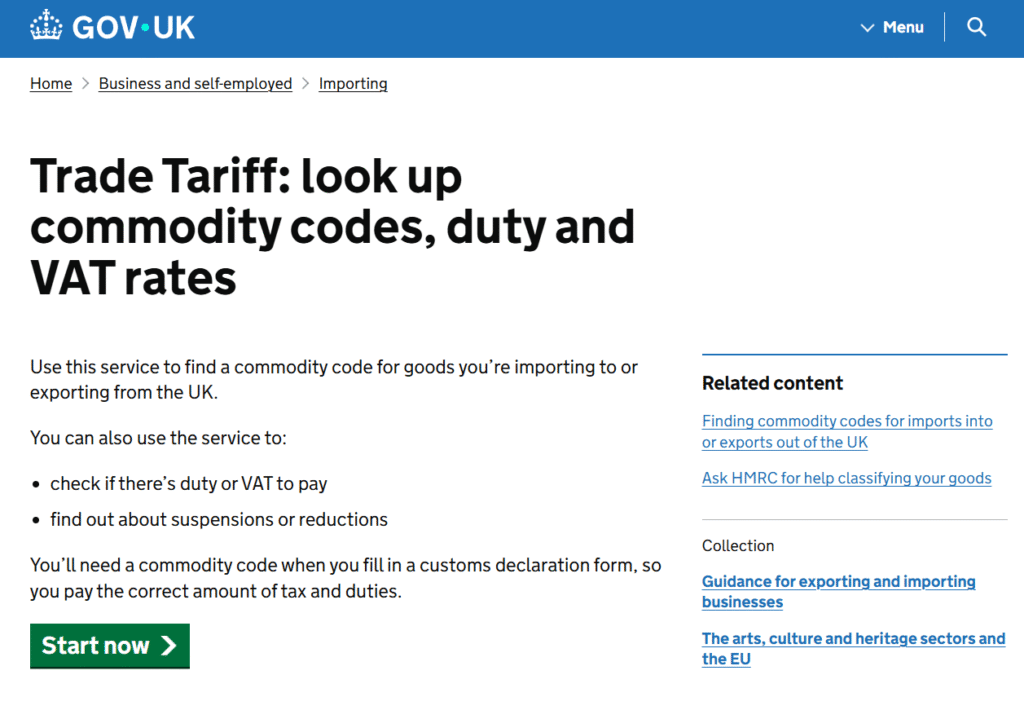HMRC CHV1 Form Assistance – Customs Value Declaration
When importing goods into the UK, HMRC requires correct declaration of the customs value to calculate import duty and VAT. The official way to provide this information is through the CHV1 form HMRC. Businesses that import goods regularly may need to complete the HMRC CHV1 to ensure compliance with UK customs regulations.
Proper completion of the HMRC CHV1 form is crucial for accurate import duty and VAT calculation in the UK. Customs Value Declaration Importance.
What is the HMRC CHV1 Form?
The CHV1 HMRC form is used to declare the customs value of goods imported into the UK. This value forms the basis for:
- Calculating import duty.
- Determining the correct import VAT.
- Ensuring compliance with customs regulations.
It is an essential form for businesses importing from outside the UK, especially where valuation is complex (e.g. transfer pricing, related parties, special discounts).
When Do You Need to File the CHV1 HMRC Form?
You must submit the HMRC CHV1 in cases such as:
- Goods purchased at discounted or non-market rates.
- Imports involving related companies or subsidiaries.
- Complex pricing arrangements (e.g. royalties, license fees).
- Cases where HMRC requests clarification on declared value.
Failure to file can result in underpayment or overpayment of duties, penalties, and compliance investigations.
How to Complete the CHV1 Form HMRC
- Download the form or fill out on the website – https://www.gov.uk/trade-tariff
- Provide importer details – company name, address, EORI number.
- State transaction details – purchase price, currency, terms of sale.
- Explain valuation adjustments – transport costs, commissions, insurance.
- Declare relationship with supplier – if relevant.
- Attach supporting documents – invoices, contracts, shipping documents.
- Submit to HMRC – usually together with customs declarations.
Example Cases – HMRC CHV1 in Action
- Case 1 – Related Companies
A UK business importing goods from its parent company filed a CHV1 form HMRC to explain the transaction value. HMRC accepted the valuation, avoiding disputes. - Case 2 – Discounted Goods
An importer bought bulk goods at below-market prices. Filing the HMRC CHV1 clarified the valuation basis and prevented delays at customs. - Case 3 – Licensing Fees
A software distributor included royalty payments in the customs value via the CHV1 HMRC form, ensuring compliance and avoiding fines.
Common Mistakes with the CHV1 HMRC
❌ Declaring only invoice price without including additional costs.
❌ Not disclosing relationship with the supplier.
❌ Missing supporting documentation.
❌ Submitting the form late, causing shipment delays.
What Happens if You Don’t File a CHV1?
- HMRC may reject customs declarations.
- Import duty and VAT may be miscalculated.
- You risk penalties for non-compliance.
- Delays at customs can lead to supply chain disruption.
Tips for a Successful CHV1 Submission
✅ Keep full documentation for all imports.
✅ Be transparent about relationships with suppliers.
✅ Include all costs – freight, insurance, royalties.
✅ Work with specialists to avoid valuation disputes.
FAQ – HMRC CHV1
Q1: Is the CHV1 required for all imports?
No, only where valuation is not straightforward or HMRC requests clarification.
Q2: Can I submit the CHV1 online?
Currently, the CHV1 HMRC form is usually submitted manually or alongside customs entries.
Q3: How long should I keep CHV1 records?
At least six years, in case of HMRC audits.
Q4: What if I make a mistake on the form?
You must notify HMRC immediately and provide corrected information.
Q5: Can Audit Consulting Group help with CHV1?
Yes – we handle valuation analysis, prepare the HMRC CHV1, and liaise directly with HMRC to prevent disputes.
Why Work With Audit Consulting Group?
At Audit Consulting Group, we know that customs valuation is complex. Our team:
- Prepares accurate CHV1 HMRC forms.
- Reviews supplier relationships and pricing.
- Ensures all costs are included in customs values.
- Protects businesses from penalties and delays.
Contact us today and let us simplify the HMRC CHV1 process for you.
CHV1 HMRC Charities VAT Form Services Cost UK
Prepare and submit CHV1 HMRC forms for charities with expert support. We assist charities with VAT claims and HMRC submissions accurately. Our CHV1 services help charities remain compliant and reclaim eligible VAT.
Service Cost Estimation
Select the service category below to calculate the estimated cost of either accounting & tax services or forms and submissions.
Select Required Services / Forms
Select one or more services/forms to receive an accurate cost estimate. You can adjust your selection at any stage.
How would you like to engage our services?
Please select whether you require a one-off service or ongoing monthly support.
Contract Duration
Your cost estimate
Apply now and get 10% OFF
Submit your request today and receive an exclusive 10% discount on your selected service.
All prices are estimates. To receive a personalised quote, please fill out the form or contact us.
Ready to get started?
Get professional support from experienced UK accountants






